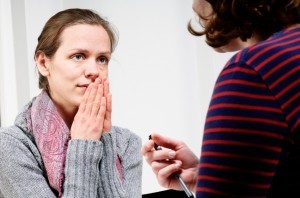PAINFULLY THIN
Food — It’s everywhere. You can’t read a magazine, watch t.v., go to a party, drive down the road etc., without being inundated with an image, a smell or offer to eat. You can hear people joke or complain all the time about how hard it is to be disciplined with their eating habits because of the fact that there are so many temptations and opportunities to eat.
Most people though can usually just laugh it off and either go ahead and partake of the offering or maybe they proudly stick to their guns and refuse it. In each case, both parties go on their merry way and don’t give it much more thought. But there are some people whose lives are tormented with the thoughts and actions of eating or not eating.
I am referring to someone who is struggling with an eating disorder. And, it is no laughing matter to them or something to joke about. In fact, they probably experience high levels of anxiety, shame, embarrassment, guilt or denial or may not even recognize that they have an eating problem.
Eating disorders remain one of the most misunderstood, stigmatized and discriminated against mental disorders. While people dealing with something such as depression seem to willingly share their struggles, people with an eating disorder seem to keep it hidden stubbornly in the dark shadows. Depending on which specific disorder is being dealt with, the over simplistic, false beliefs that a person should just “eat more” or “not eat as much” continue to be repeated in a nonstop fashion by well meaning people.
There are so many misconceptions in our society about what causes eating disorders. Most people do not realize that the disorders are rarely about food or just wanting to be thin. The fact is, sufferers use food and unhealthy behaviors like dieting, starving, bingeing and purging to cope with unpleasant and overwhelming emotions and stressful situations. By “controlling” their eating habits they only find relief in the short term though. Long term wise, these behaviors actually increase anxiety and stress along with creating other serious complications.
WHAT IS AN EATING DISORDER?
Eating disorders are illnesses that are characterized by irregular eating habits such as inadequate or excessive food intake along with severe distress or concern about body weight or shape which can ultimately damage an individual’s well-being. The most common forms of eating disorders include Anorexia Nervosa, Bulimia Nervosa, and Binge Eating Disorder. They affect both females and males although the percentages are heavier with females.
Eating disorders can develop during any stage in life but usually appear during the teen years or young adulthood. They commonly coexist with other conditions, such as anxiety disorders, substance abuse, or depression.
WHAT CAUSES EATING DISORDERS?
Well, there is no pat answer for that. Eating disorders are complex and influenced by many factors. Though the exact cause of eating disorders is unknown, it is generally believed that a combination of biological, psychological, and /or environmental abnormalities contribute to the birth and progression of these illnesses.
Examples of biological factors include:
- Abnormal hormone levels
- Genetics – research has shown that eating disorders tend to run in families
Examples of psychological factors include:
- Low self-esteem
- Trouble coping with emotions or expressing your emotions
- Perfectionism
- Negative body image
- Feelings of hopelessness and inadequacy
Examples of environmental factors include:
- Family or other relationship problems
- Difficult or turbulent childhood
- History of physical or sexual abuse
- Peer pressure
- Being bullied because of weight or appearance in general
- Activities that encourage thinness or focus on weight, such as dancing, wrestling, modeling, gymnastics, and running.
The modern culture in which we live can increase the risk of eating disorders for those individuals that have a genetic predisposition to them. Unfortunately, our society bombards us with messages that encourage dieting, body dissatisfaction and wanting to be thin. You can’t even get through the checkout at a grocery store without having to pass the rack of magazines telling us how to “drop the pounds rapidly,” “get the body that you’ve always wanted” or some other “helpful” weight loss tip that will supposedly change our lives. Our societal beauty standards promotes unrealistically thin body shapes lending us to believe that thinness equals attractiveness, health, success, or love and places too much emphasis on physical appearance at the expense of more meaningful qualities and strengths.
Eating disorders are illnesses, not character flaws or choices. Individuals suffering from them did not seek out and choose to have an eating disorder. They can be complicated, serious and potentially devastating and need to be addressed. What started out as something they thought they were in control of soon became something uncontrollable and destructive.
Those suffering from eating disorders can often find themselves feeling alone, frightened and hopeless. If you know or suspect you might have an eating disorder, just know that there is help and treatment available for you. It is important that you talk to somebody about what you are going through.
Seeking help can be challenging and scary but I would invite you to call me at (616) 516-1570 and in a nonjudgemental and supportive way I would like to help you with a treatment plan that is right for you.

